2016 年广西民族大学英语教学论考研真题 A 卷
I. There are 12 incomplete statements and 8 questions in this part. Each statement
or question has four answers marked A, B, C and D. Read the choices carefully and
choose the one which can best complete the statement or answer the question and then
write your answers on the Answer Sheet. (30 points, 1.5 points for each)
1. Chomsky believes that linguistic study and research can help explain what happens
in
the mind, and linguistics should be regarded as a branch of
A. methodology
B. psychology
C. sociology
D. anthropology
2. Generally speaking, the Grammar-translation Method belongs to the school of
linguistics.
A. applied
B. modern
C. traditional
D. behaviourist
3. The neogrammarians, represented by Hermann Paul, formed the main linguistic base
of
A. the Grammar-Translation Method
C. the Oral Approach
B. the Direct Method
D. the Audiolingual Method
4. The Oral Approach/Situational Language Teaching believes in a theory of learning
the language is based on a type of
theory.
A. behaviorist habit formation
B. cognitive psychology
B. structural linguistics
D. functional linguistics
5. The Natural Approach sees the language acquirer as a
input.
of comprehensible
A. receiver
B. producer
C. processor
D. acquirer
6. The Audiolingual Method insists on accurate reproduction of sentence patterns
and
their attitude towards students’ language error is
A. positive
B. negative
C. passive
D. active
7. The monitor theory, which is very popular among foreign language teachers
in
, was put forward by Stephen Krashen in the late 1970s.
A. China
B. France
C. Britain
D. America
8. James Asher was the founder of
A. the Direct Method
C. Total Physical Response
B. the Cognitive Approach
D. suggestopaedia
�
9. With regard to syllabus design, the Communicative approach emphasizes
A. communication
C. teacher’s skills
B. expressing of meaning
D. learners’ needs
10. The Cognitive Approach believes that
language learning.
play a decisive role in foreign
A. the teacher
B. the students
C. the materials
D. the environment
11. English teaching in China didn’t enter into the formal educational system
until the ______ century.
A. late 19th
B. early 20th
D. late 20th
C. mid-20th
12. The generative linguist is interested not only in ______ language but also in
explaining language.
A. teaching
D. understanding
B. describing
C. using
13. Which role does the teacher play in the following activities?
When answering the teacher’ question, if a student doesn’t seem to be ready for
an answer, the teacher gives hints.
A. controller
B. participant
D. prompter
C. assessor
14. In teaching grammar, what stage can the teacher use for following activity?
The teacher asks the students to produce sentences based on the pictures
provided.
A. presentation
B. practice
C. application D. production
15. Which reading skill is the teacher using in teaching reading?
The teacher asks the students to try to guess information or ideas that go beyond
the literal meaning of the text.
A.inferring or reading between the lines
B.recognizing organization of the text
C.predicting
D.scanning
16. How is the following activity organized?
The teacher asks all the students to do completion exercises.
A. pair work
B. whole-class work
C. individual
D. group work
17. In teaching vocabulary, what stage is most suitable for the following activity
The teacher uses word formation rules and common affixes to build
new lexical knowledge.
A. presentation
B. production
C. practice
D. B & C
�
18. What technique is the teacher using in teaching writing?
Students editing of each others’ writings
A. conferencing
B. peer-editing
C. Revising
D. self-editing
19. What activity the teacher is doing?
The teacher gives the first half of the dialogue by asking a question:
(The teacher holds on a picture with a person reading a book)
T: what were you doing when I called you last night?
S: I was reading a book when you called.
A. controlled activity
C. commutative activity
B Semi-controlled activity
D. free activity
20. Which type of approach can best describe the following learning pattern?
Discussion about how to solve certain problems
A.autonomous learning
B.interactive learning
C.contextualized learning
D.task-based learning
II. Decided whether the following statements are true (T) or false (F).
Write your answers on the Answer Sheet. (10 points, 1 point for each)
1. As a teaching technique, the Grammar-translation Method teaches grammar
inductively.
2. The Direct Method emphasizes the importance of spoken language, therefore holds
that reading and writing should be taught only after speaking.
3. According to the Inductive Way Grammar Teaching, the grammar rules should be
worked out by the students themselves from examples without explicit explanation
from the teacher.
4. In Cognitive Approach, second language acquisition is viewed as the acquisition
of knowledge, involving cognitive representations that regulate and guide internal
performance.
5. In Communicative Approach teacher is viewed as the authority of the classroom.
6. Emphasis on learning to communicate in the target language is one of the main
features of The Communicative Approach.
�
7. According to Krashen, language learning comes about through using target language
communicatively, rather than through practicing language skills.
8. According to Skinner, reward was much more effective than punishment in
a teaching situation.
9. Classroom instructions refer to the type of language teachers use to organize
or guide learning
10. Assessment often takes the ‘pencil and paper’ form and it is only done at the
end of
a learning period.
III. Filling in the blanks. Write your answers on the Answer Sheet (40 points, 2
points for each)
1. In Krashens Monitor Mode of second language development, there are two distinct
processes, one is acquisition, and the other is
.
.
2.
structuralism.
,
a linguist in America, is regarded as the father of American
3. An ultimate purpose of learning a foreign language in a Grammar-Translation
classroom if to enable the learners to
its literature.
4. Ideally Lesson planning should be done at two levels:
micro planning.
and
5. The three models for teaching reading are:
interactive model.
, top-down and
6. The Audiolingual Method uses dialogues as the main form of language presentation
and
as the main training techniques.
7. The Cognitive Approach believes that language learning is a process which
involves
and not simply the forming of habits.
8. The
theory.
is the center of Krashen’s second language learning
9. According to Hedge, communicative competence includes linguistic competence,
pragmatic competence,
, strategic competence and fluency.
�
10. The teacher plays an
role in Total Physical Response.
11. A typical task-based Language Teaching procedure usually consists of three
stages: Pre-task, Task cycle and
.
12. In teaching grammar, mechanical practice is mainly used to help the learners
to
master
accurately.
13. Scanning is a type of pre-reading activity, which means to read to locate specific
.
14. The main procedures of process writing include creating a motivation to write,
brainstorming,
revising
and conferencing.
freewriting,
mapping,
outlining,
drafting,
15. A PPP model refers to Presentation,
and Production.
The
16.
students’
general
aim
.
of
the
Communicative
Approach
is
to
develop
the
17. Tactile learners learn more effectively through
.
18. There are two methods of assessment:
and formative assessment.
19. In practicing language skills, controlled activities mainly focus on
and accuracy.
20. The functional view of linguistic not only sees language as a linguistic system
but also a
for doing things
IV. Answer the following questions. Write your answers on the Answer Sheet (40 points,
8 points for each)
1.What are mechanical practice and meaningful practice in grammar teaching? In order
to teach grammar effectively, how to use these two practices?
2.What roles do you think a teacher should play in the classroom? State your reasons.
�
How do you understand the relationship between the grammatical forms of a
3.
language and their communicative functions?
4.What rules do you think a teacher should follow in order to make classroom
instruction effective?
5.What are the objectives of the pre-reading stages of teaching reading and what
techniques can be employed to fulfill these objectives?
V. Lesson designing (30 points)
Directions: In this part, you are to design a 40-minute writing lesson according
to the information provided.
Information: Type of the lesson: writing
Student level: 40 junior middle school students, Grade 8
Lesson duration: 40 minutes
The Aim of the lesson: By the end of the lesson, students will be able
to write a 100-word passage describing a person in terms of: appearance, personality
and hobbies.
Your answer should include:
1.A lesson plan which includes:
1)Teaching objectives ( at least 3 objectives, 6 points , 2 points for each )
2)Teaching important and difficult points (4 points, 2 points for each )
3)Teaching aids (3 points)
4)Teaching procedures ( at least 3 steps, 9 points, 3 points for each)
2.Predicted problems and solutions (8 points, 4 points for each)
�
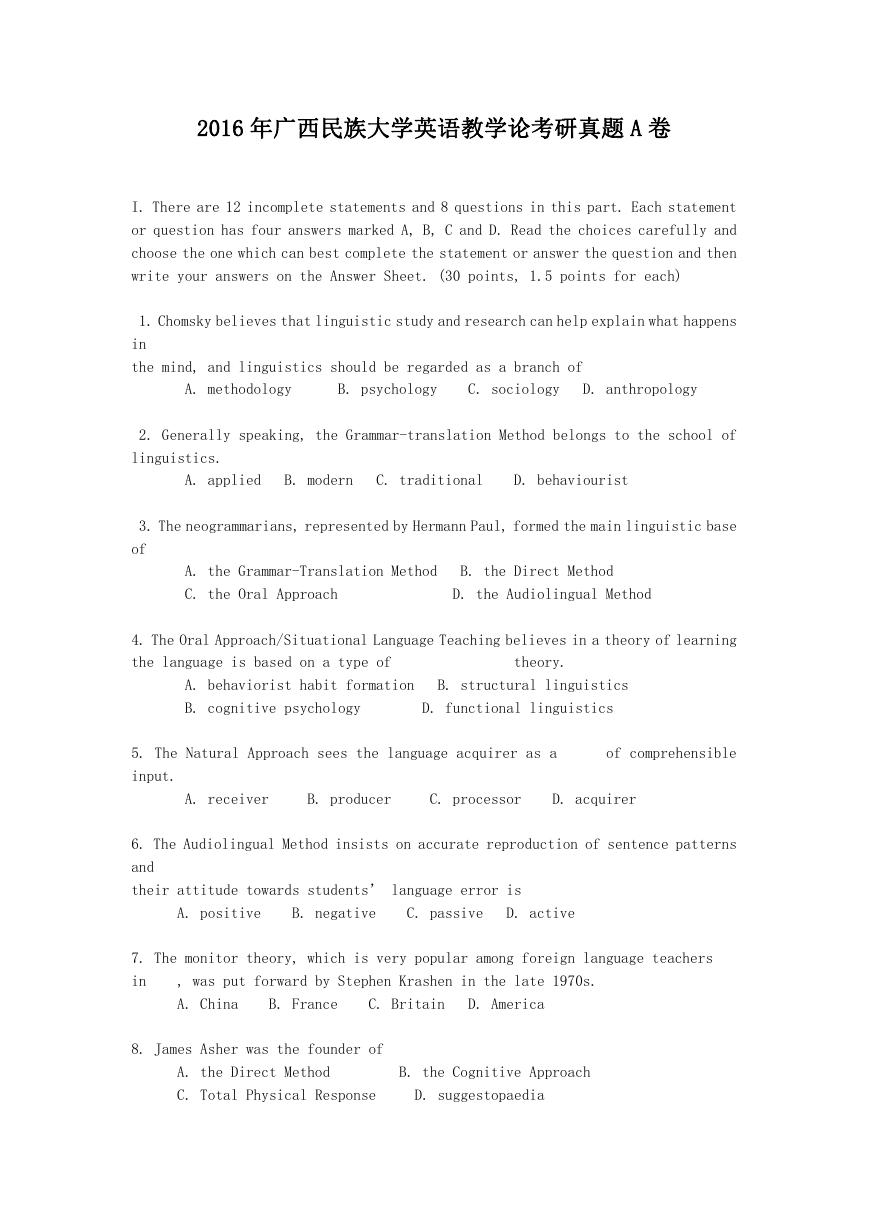
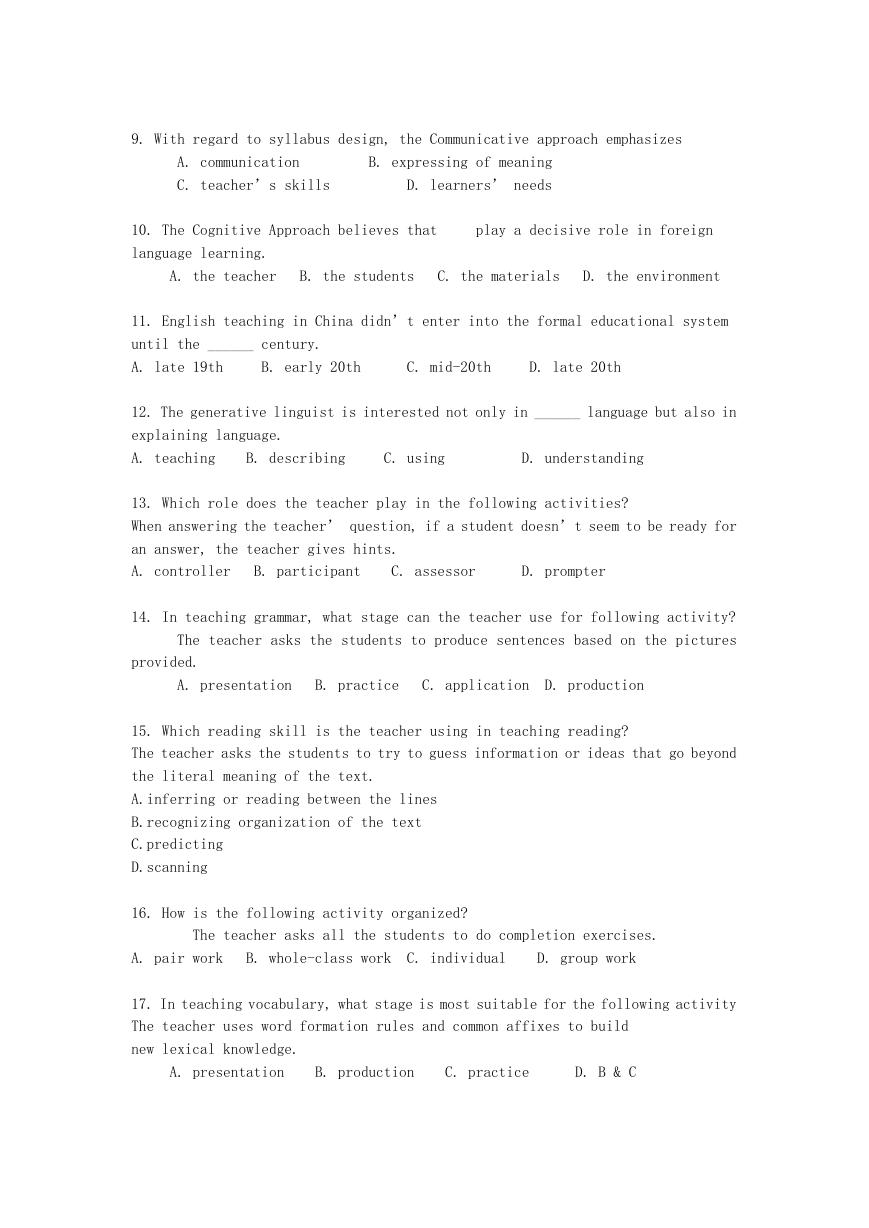

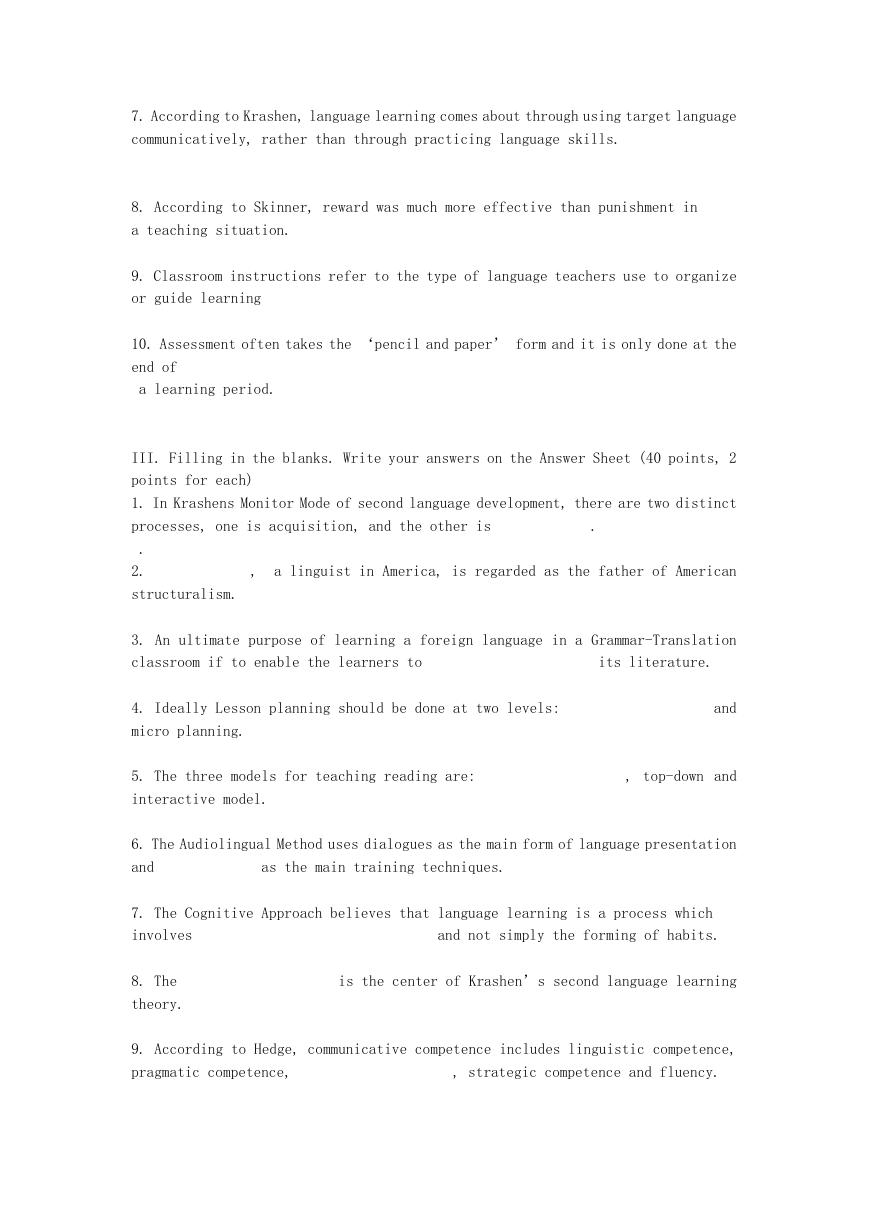
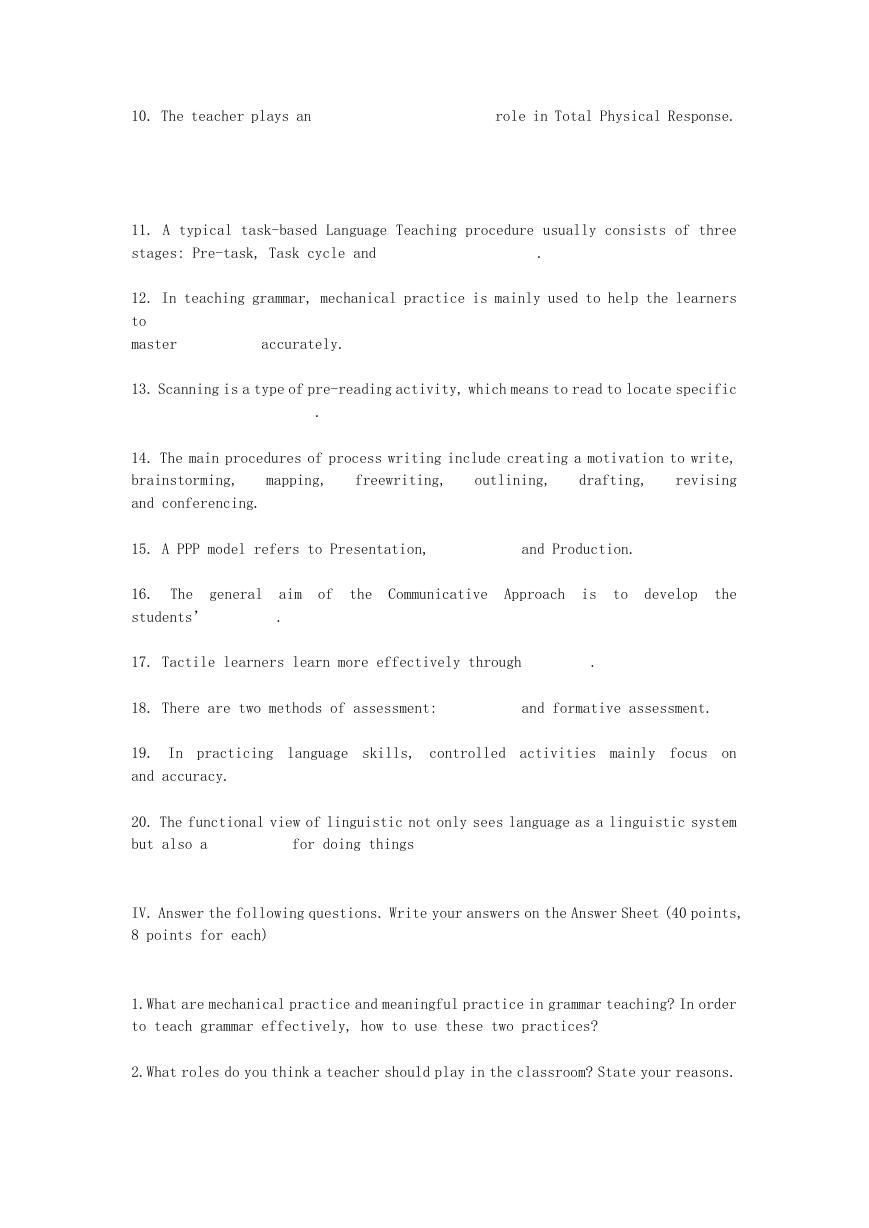
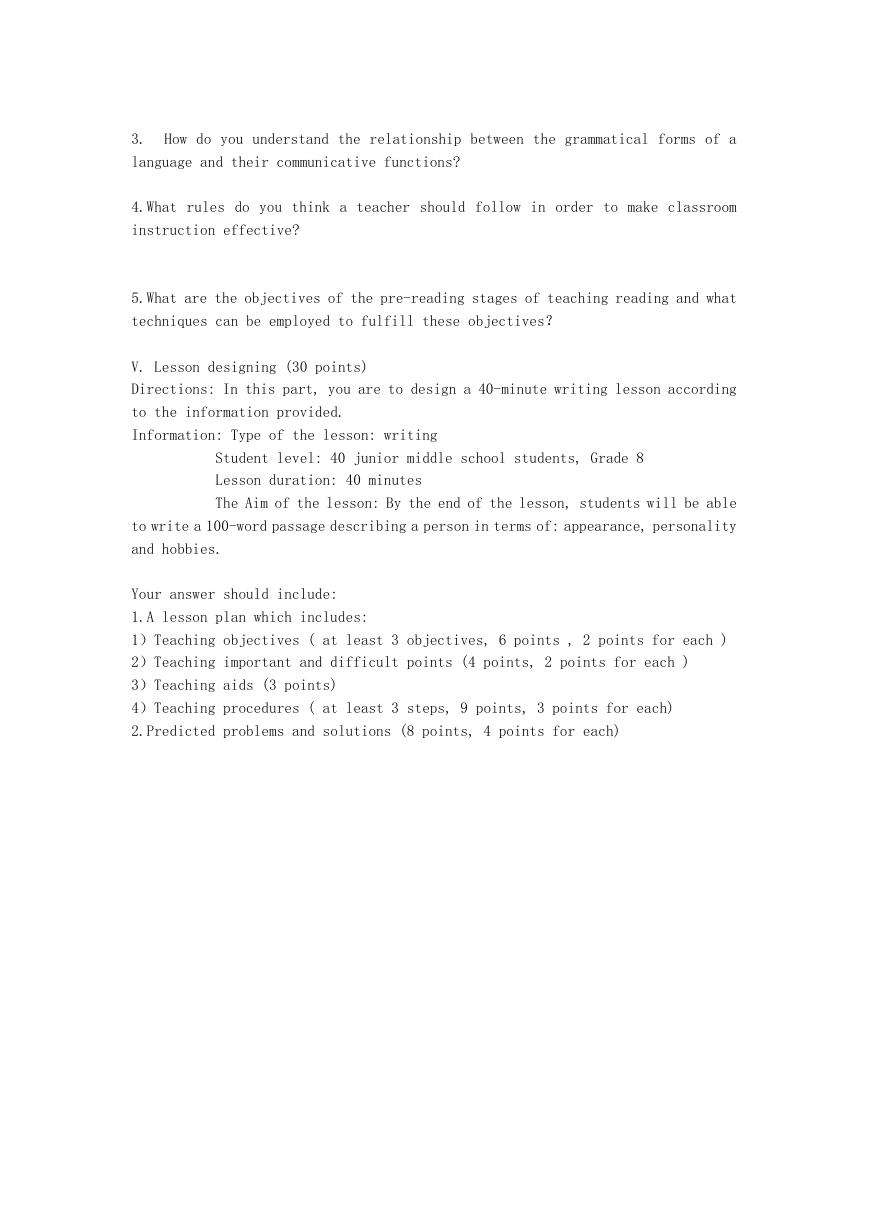






 2023年江西萍乡中考道德与法治真题及答案.doc
2023年江西萍乡中考道德与法治真题及答案.doc 2012年重庆南川中考生物真题及答案.doc
2012年重庆南川中考生物真题及答案.doc 2013年江西师范大学地理学综合及文艺理论基础考研真题.doc
2013年江西师范大学地理学综合及文艺理论基础考研真题.doc 2020年四川甘孜小升初语文真题及答案I卷.doc
2020年四川甘孜小升初语文真题及答案I卷.doc 2020年注册岩土工程师专业基础考试真题及答案.doc
2020年注册岩土工程师专业基础考试真题及答案.doc 2023-2024学年福建省厦门市九年级上学期数学月考试题及答案.doc
2023-2024学年福建省厦门市九年级上学期数学月考试题及答案.doc 2021-2022学年辽宁省沈阳市大东区九年级上学期语文期末试题及答案.doc
2021-2022学年辽宁省沈阳市大东区九年级上学期语文期末试题及答案.doc 2022-2023学年北京东城区初三第一学期物理期末试卷及答案.doc
2022-2023学年北京东城区初三第一学期物理期末试卷及答案.doc 2018上半年江西教师资格初中地理学科知识与教学能力真题及答案.doc
2018上半年江西教师资格初中地理学科知识与教学能力真题及答案.doc 2012年河北国家公务员申论考试真题及答案-省级.doc
2012年河北国家公务员申论考试真题及答案-省级.doc 2020-2021学年江苏省扬州市江都区邵樊片九年级上学期数学第一次质量检测试题及答案.doc
2020-2021学年江苏省扬州市江都区邵樊片九年级上学期数学第一次质量检测试题及答案.doc 2022下半年黑龙江教师资格证中学综合素质真题及答案.doc
2022下半年黑龙江教师资格证中学综合素质真题及答案.doc